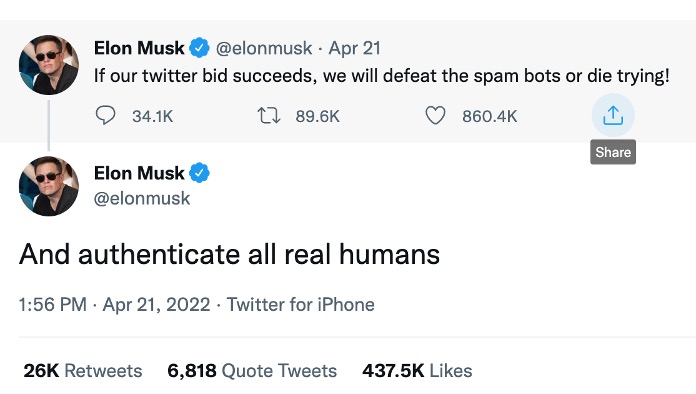The business world is buzzing about the latest mega acquisition by the world’s richest and most interesting entrepreneur. That’s right, Elon Musk purchased Twitter for nearly $44B and pledged to take the company private. Here are some shifts we can anticipate from this huge move.
Free speech will be a focus.
Musk’s “free speech absolutism” and desire to take the company private will allow Twitter to shirk some of the “responsibilities” that being a public company required. Once there’s less pressure from shareholders, advertisers, and regulators, we’ll discover how Twitter’s safety is affected; free speech, like we see on platforms with less restrictions (read: Reddit), have a tendency to share darker, and sometimes harmful, information.
Innovation will accelerate.
If we know anything from Musk, it’s that he’ll force innovation at Twitter. In his downtime, and seemingly overnight, he creates companies with billon-dollar values in all sorts of innovative spaces. Remember the “Boring Company,” his pertly named underground tunnel operation inspired by a stint in Los Angeles traffic? Will Twitter incorporate better video capabilities? It’s hard to say, but the platform could certainly use a facelift. The danger here is trying to do too much (which they’ve done in the past), and ending up with a similar problem Instagram is facing: competing with TikTok.
Authentication might mean real opportunity.
In much of his content, Musk shares his desire to “authenticate all humans.” He could be suggesting an overhaul, or at least an amplification, of Twitter’s verification system, currently signaled by a blue check next to a user’s name. If the world begins trusting authentication, there are HUGE opportunities to monetize in a few spaces. Authentication expansion could also make Twitter a safer platform, depending on how public that authentication is. Musk’s aim at bots is at least partly to ensure people are who they say they are, which could assist in some of the safety and misinformation challenges Twitter faces today. Authentication could also temper some of the hate and abuse that occurs on Twitter, since people accurately identified are less likely to lash out.
Financial opportunities in payments.
Musk’s early money was in payments. Don’t forget X.com—the simple payments platform that became what we know as PayPal. What would be the value in “authenticating the world” if it didn’t move money? Aha. One of the largest challenges in the payments space is authentication, and Musk knows that. I imagine he’s banking on it. After all, you must verify real people on both ends of a transaction. The more efficiently you can verify, the more money you can move.
Other social channels are nervous.
By taking the company private, Musk avoids significant scrutiny and allows the platform to, well, stand on its own. He won’t have to stress over quarterly earnings reports; he can spend his time focusing on the larger opportunities behind the platform. This allows Twitter to innovate without being questioned on next quarter’s results, a point that might have Mark Z nervous (and a bit jealous). Twitter needn’t pivot to be more like TikTok or pursue the latest trend. They can be much more deliberate.
While it’s all theories right now, Twitter’s next steps, and the affects those steps have on social media and our world in general, will certainly be interesting to watch. Stay tuned!


